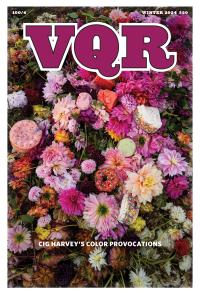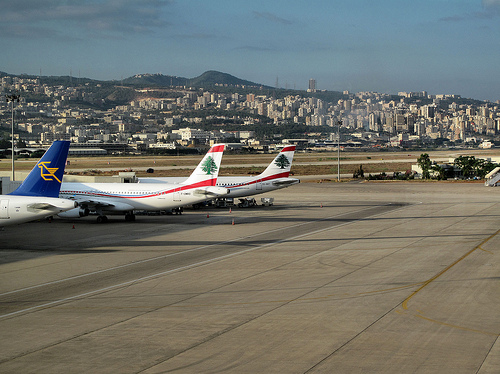
House-Hunting After the Bomb
The following post is part of our online companion to our Spring 2013 issue on The Business of Literature. Click here for an overview of the issue.
——
Imagine my displeasure when I found myself, last November, hung-over and haggard, pushing a stroller through the security cordon at the Beirut airport. It was eight in the morning, a car bomb three weeks earlier had killed three and injured 100 in downtown Beirut, and I was in line for a flight to Istanbul, engaged in something not unlike fleeing for our lives.
While I stood at the gate, the sun was just poking through clouds outside, and inside men with beards sat around watching Black Hawk Down on an overhead monitor, just another sunrise in Lebanon. I looked up, watching Americans trying to fight off a relentless Somali horde, the death toll mounting by the instant. Head swiveling, I hoped for refuge; the damn thing blared from every screen, full volume, no escape.
“Daddy, that’s scary,” said Loretta, my three-year-old daughter. On the TV, a charred American was being dragged behind a truck, and a machine gun ripped a young Somali fighter in half. I grabbed my daughter and walked away.
This was our first major return trip to Istanbul since we’d moved to Beirut. When we’d lived in Turkey, I had come to hate that city’s megalopolis, with all the yelling and construction everywhere, all the new money and boats roaring around, and the insufferable whirling dervishes, and the worst wine you can imagine (and it cost so much, with the morality tax). So when we finally moved to Lebanon, where life was allegedly much better, with better wine and good friends and a small-town vibe, it seemed like everything would finally be OK. But in the spring, our street had been the site of a massive shoot-out, then a big bomb detonated in the fall.
It had been two years since my wife, Kelly, accepted a full-time job as a Middle East correspondent, which I do not need to tell you is a complicated thing for everyone involved. In Baghdad, her first posting, Kelly kind of liked it—even with the mortars raining down and the absence of a grocery store she could safely visit without worrying about the unlikely but still daunting possibility of being kidnapped by Al Qaeda in Iraq or something worse, and the head-chopping that could follow. But she was doing something important, working as a reporter, meeting great colleagues, changing the world. I even visited her in Baghdad once, Loretta safely in Istanbul, and while in Iraq, I was scared out of my mind to eat a fish dinner by the Tigris, and my fears seemed to be justified when a mortar landed nearby, and I was ready to jump under a table (all the Iraqis didn’t even flinch). Another morning, a rocket turned a nearby apartment complex into dust—and despite my fear and my inability to process it all, I could still see the hazy shape of the amazing woman my wife was becoming.
But who was I? Mostly alone in Istanbul, with our daughter, miserable and pissed and drunk and feeling sorry for myself—until we moved to Beirut, where the wine is good, and where we finally all lived together. I even started working again, a little. Then violence erupted, and better to be alone in Istanbul than caught in Beirut’s crossfires—as rare as they may be, depending on your neighborhood.
On the plane, people looked worried, eyes scanning the other passengers, everyone stuffing their luggage too quickly into the bins, items falling out, babies screaming, the parents sitting down with booming sighs, this ambient hunger for the drink cart to come around, tinkling with liquid calm.
I’m sure it was mostly all in my head, but I had practiced so many times imagining what it would look like when we left, when it was too violent for us to stay any longer. There’d be a rush for the airport, but goons with guns might set tires on fire, and the roads would become impassable. Western countries might send evacuation ships, as they’d done during the 2006 war with Israel. I’d heard the British were fast and nice and professional, but word was that the Americans were sluggish and even a bit dickish. I didn’t relish the idea of standing in line with a thousand sweaty frightened people, trying to board a boat as gunfire and bombs tore up the city behind us.
Perhaps sensing the gravity of our trip, though we’d hid from her as best as we could all the details of a bomb that ravaged a city block—and though my wife was gone, on a reporting trip—Loretta was excited and antsy. In her airline seat, she buckled and unbuckled her belt, head tilted to hear the satisfying snap of the metal action. Then she yanked the laminated card from the seat pocket and thrust it in my face.
“Say the words,” she said, pointing emphatically at an image of a man doubled over, flames licking at the edges of an airplane compartment. The engines outside roared to life.
I absentmindedly patted her hand, looking out over the city for signs of smoke.
“Daddy? Talk to me!” She grabbed my face and pointed it at her. “Talk!”
“If we experience turbulence, masks will descend from the ceiling,” I told the girl, her tiny hands mashing my cheeks together. “I’ll need to put my mask on first. Then I’ll put on yours.”
She nodded thoughtfully, then picked her nose.
Back in Istanbul, old emotions came in like the tide—my wife away on some assignment, though we’d reunite shortly, me outmatched by my child and an ancient city. I vowed to do better this time. I installed Loretta at our temporary apartment in Beyoglu, to be cared for by a friend of our old babysitter, and I set out to assemble a new life. I knew it was obnoxious to have ever hated Istanbul. It is one of the world’s best cities, with an enchanting river and seven of the most stunning mosques in all of Islam. The metro is orderly, men patiently and professionally sell newspapers, without looking grizzled or war-ravaged or melancholy to the point of convalescence, such as in beautiful, broken Beirut. On the bus I observed the orderly traffic, the clean paint on the medians, oceans of grass, and all the gates and fences. The computer that took the fares beeped and blipped, and my heart opened.
Always, though, looks are deceiving. Turkey has its own problems. Istanbul sits on a major earthquake fault line, Kurdish separatists have been all too happy to blow up a bus or two, and a rising disparity between rich and poor means the occasional tourist gets murdered.
No matter where you go, you can never entirely escape the reality that life can be hard, that you can pretend and struggle and plan all you want, but you’ll never be entirely safe.
——
About the author: Nathan Deuel lives in Beirut and has contributed to The New York Times, GQ, The Paris Review, and Los Angeles Review of Books, among others. His first book, a collection of essays, will be published by Dzanc in May 2014.

